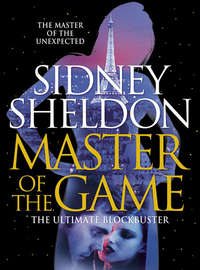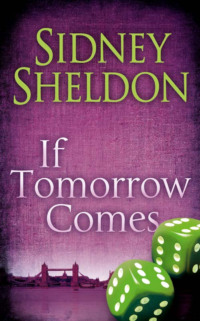
Полная версия
The Other Side of Me

The Other Side of Me
Sidney Sheldon

For my beloved granddaughters, Lizy and Rebecca
so that they will know what a magical journey I had
‘He that has no fools, knaves nor beggars in his family was begot by a flash of lightning.’
THOMAS FULLER
Seventeenth-century English clergyman
Table of Contents
Cover Page
Title Page
Dedication
Epigraph
One
Two
Three
Four
Five
Six
Seven
Eight
Nine
Ten
Eleven
Twelve
Thirteen
Fourteen
Fifteen
Sixteen
Seventeen
Eighteen
Nineteen
Twenty
Twenty-One
Twenty-Two
Twenty-Three
Twenty-Four
Twenty-Five
Twenty-Six
Twenty-Seven
Twenty-Eight
Twenty-Nine
Thirty
Thirty-One
Thirty-Two
Thirty-Three
Afterword
Sidney Sheldon’s Credits
Index
Preview
About the Author
Books by Sidney Sheldon
Copyright
About the Publisher
ONE
At the age of seventeen, working as a delivery boy at Afremow’s drugstore in Chicago was the perfect job, because it made it possible for me to steal enough sleeping pills to commit suicide. I was not certain exactly how many pills I would need, so I arbitrarily decided on twenty, and I was careful to pocket only a few at a time so as not to arouse the suspicion of our pharmacist. I had read that whiskey and sleeping pills were a deadly combination, and I intended to mix them, to make sure I would die.
It was Saturday—the Saturday I had been waiting for. My parents would be away for the weekend and my brother, Richard, was staying at a friend’s. Our apartment would be deserted, so there would be no one there to interfere with my plan.
At six o’clock, the pharmacist called out, ‘Closing time.’
He had no idea how right he was. It was time to close out all the things that were wrong with my life. I knew it wasn’t just me. It was the whole country.
The year was 1934, and America was going through a devastating crisis. The stock market had crashed and thousands of banks had failed. Businesses were folding everywhere. More than 13 million people had lost their jobs and were desperate. Wages had plunged to as low as a nickel an hour. A million vagabonds, including 200,000 children, were roaming the country. We were in the grip of a disastrous depression. Former millionaires were committing suicide, and executives were selling apples in the streets.
The most popular song was ‘Gloomy Sunday.’ I had memorized some of the lyrics:
Gloomy is Sunday. With shadows I spend it all. My heart and I Have decided to end it all.
The world was bleak and it fit my mood perfectly. I had reached the depths of despair. I could see no rhyme or reason for my existence. I felt dislocated and lost. I was miserable and desperately longing for something that I couldn’t define or name.
We lived near Lake Michigan, only a few blocks from the shore, and one night I walked down there to try to calm myself. It was a windy night and the sky was filled with clouds.
I looked up and said, ‘If there is a God, show yourself to me.’
And as I stood staring at the sky, the clouds merged together, forming a huge face. There was a sudden flash of lightning that gave the face blazing eyes. I ran all the way home, in a panic.
I lived with my family in a small, third-floor apartment in Rogers Park. The great showman, Mike Todd, said that he was often broke but he never felt poor. I, however, felt poor all the time because we were living in the demeaning kind of grinding poverty where, in a freezing winter, you had to keep the radiator off to save money and you learned to turn the lights out when not in use. You squeezed the last drops out of the ketchup bottle and the last dab of toothpaste out of the tube. But I was about to escape all that.
When I arrived at our dreary apartment, it was deserted. My parents had already left for the weekend and my brother had gone. There was no one to stop me from what I intended to do.
I walked into the little bedroom that Richard and I shared and I carefully removed the bag of sleeping pills I had hidden under the dresser. Next, I went into the kitchen, took a bottle of bourbon from the shelf where my father kept it and carried it back to the bedroom. I looked at the pills and the bourbon and I wondered how long it would take for them to work. I poured some whiskey into a glass and raised it to my lips. I would not let myself think about what I was doing. I took a swallow of the whiskey and the acrid taste of it made me choke. I picked up a handful of sleeping pills and started to raise them to my mouth, when a voice said, ‘What are you doing?’
I spun around, spilling some of the whiskey and dropping some of the pills.
My father was standing in the bedroom doorway. He moved closer. ‘I didn’t know you drank.’
I looked at him, stunned. ‘I—I thought you were gone.’
‘I forgot something. I’ll ask you again. What are you doing?’ He took the glass of whiskey from my hand.
My mind was racing. ‘Nothing, nothing.’
He was frowning. ‘This isn’t like you, Sidney. What’s wrong?’ He saw the pile of sleeping pills. ‘My God! What’s going on here? What are these?’
No plausible lie came to my mind. I said defiantly, ‘They’re sleeping pills.’
‘Why?’
‘I’m going to—to commit suicide.’
There was a silence. Then my father said, ‘I had no idea you were so unhappy.’
‘You can’t stop me, because if you stop me now I’ll do it tomorrow.’
He stood there, studying me. ‘It’s your life. You can do anything you want with it.’ He hesitated. ‘If you’re not in too big a hurry, why don’t we go for a little walk?’
I knew exactly what he was thinking. My father was a salesman. He was going to try to talk me out of my plan, but he didn’t have a chance. I knew what I was going to do. I said, ‘All right.’
‘Put on a coat. You don’t want to catch cold.’
The irony of that made me smile.
Five minutes later my father and I were headed down windswept streets that were empty of pedestrians because of the freezing temperature.
After a long silence, my father said, ‘Tell me about it, son. Why do you want to commit suicide?’
Where could I begin? How could I explain to him how lonely and trapped I felt? I desperately wanted a better life but there was no better life for me. I wanted a wonderful future and there was no wonderful future. I had glowing daydreams, but at the end of the day I was a delivery boy working in a drug store.
My fantasy was to go to college, but there was no money for that. My dream had been to be a writer. I had written dozens of short stories and sent them to Story magazine, Collier’s, and the Saturday Evening Post, and I had gotten back printed rejections. I had finally decided I couldn’t spend the rest of my life in this suffocating misery.
My father was talking to me. ‘…and there are so many beautiful places in the world you haven’t seen…’
I tuned him out. If he leaves tonight, I can go on with my plan.
‘…you’d love Rome…’
If he tries to stop me now, I’ll do it when he leaves. I was busy with my thoughts, barely listening to what he was saying.
‘Sidney, you told me that you wanted to be a writer more than anything in the world.’
He suddenly had my attention. ‘That was yesterday.’
‘What about tomorrow?’
I looked at him, puzzled. ‘What?’
‘You don’t know what can happen tomorrow. Life is like a novel, isn’t it? It’s filled with suspense. You have no idea what’s going to happen until you turn the page.’
‘I know what’s going to happen. Nothing.’
‘You don’t really know that, do you? Every day is a different page, Sidney, and they can be full of surprises. You’ll never know what’s next until you turn the page.’
I thought about that. He did have a point. Every tomorrow was like the next page of a novel.
We turned the corner and walked down a deserted street. ‘If you really want to commit suicide, Sidney, I understand. But I’d hate to see you close the book too soon and miss all the excitement that could happen to you on the next page—the page you’re going to write.’
Don’t close the book too soon…Was I closing it too soon? Something wonderful could happen tomorrow.
Either my father was a superb salesman or I wasn’t fully committed to ending my life, because by the end of the next block I had decided to postpone my plan.
But I intended to keep my options open.
TWO
I was born in Chicago, on a kitchen table that I made with my own hands. At least, my mother, Natalie, insisted it was so. Natalie was my North Star, my comforter, my protector. I was her first child, and she never got over the miracle of birth. She could not talk about me without the aid of a thesaurus. I was brilliant, talented, handsome, and witty—and that was before I was six months old.
I never addressed my parents as ‘Mother’ and ‘Father.’ They preferred that I call them ‘Natalie’ and ‘Otto,’ possibly because it made them feel younger.
Natalie Marcus was born in Slavitka, Russia, near Odessa, during the reign of the czars. When she was ten years old she escaped a Russian pogrom against Jews, and was brought to America by her mother, Anna.
Natalie was a beauty. She was five foot five inches tall, with soft brown hair, intelligent gray eyes, and lovely features. She had the soul of a romantic and a rich inner life. She had no formal education, but she had taught herself to read. She loved classical music and books. Her dream was to marry a prince and travel around the world.
Her prince turned out to be Otto Schechtel, a Chicago street fighter who had dropped out of school after the sixth grade. Otto was handsome and charming, and it was easy to see why Natalie had been attracted to him. They were both dreamers, but they had different dreams. Natalie dreamed of a romantic world, with castles in Spain and moonlit gondola rides in Venice, while Otto’s fantasies consisted of impractical get-rich-quick schemes. Someone said that all it took to be a successful writer was paper and a pen and a dysfunctional family. I was raised by two such families.
In this corner I would like to present the Marcus clan: two brothers, Sam and Al, and three sisters, Pauline, Natalie, and Fran.
And in the opposite corner we have the Schechtels: two brothers, Harry and Otto, and five sisters, Rose, Bess, Emma, Mildred, and Tillie.
The Schechtels were extroverts, informal and street smart. The Marcuses were introverted and reserved. The two families were not only dissimilar; they had absolutely nothing in common. And so, fate decided to amuse itself.
Harry Schechtel married Pauline Marcus. Otto Schechtel married Natalie Marcus. Tillie Schechtel married Al Marcus. And if that were not enough, Sam Marcus married Pauline’s best friend. It was a marital feeding frenzy.
Otto’s older brother, Harry, was the most formidable member of the Schechtel clan. He was five foot ten, muscular and powerful, with a commanding personality. If we had been Italian, he would have been the consigliere. He was the one that Otto and the others went to for advice. Harry and Pauline had four young boys—Seymour, Eddie, Howard, and Steve. Seymour was only six months older than I, but he always seemed older than his age.
In the Marcus family, Al was the charmer, good looking and amusing, the family bon vivant. He liked to gamble and flirt. Sam Marcus was the solemn elder statesman who disapproved of the Schechtels’ lifestyle. Sam’s business was running checkroom concessions in various Chicago hotels.
Sometimes when my uncles got together, they would go into a corner and talk about a mysterious thing called sex. It sounded wonderful. I prayed that it wouldn’t go away before I grew up.
Otto was a spendthrift who enjoyed throwing money around, whether he had it or not. He would often invite a dozen guests to an expensive restaurant, and when the bill came, borrow the money from one of them to pay the tab.
Natalie could not stand borrowing or owing money. She had a strong sense of responsibility. As I grew older, I began to realize how totally unsuited they were for each other. My mother was miserable, married to a man she had no respect for, living an inner life that he could not understand. My father had married a fairytale princess, only to find himself bewildered when the honeymoon ended.
They argued constantly, but these were not normal arguments; they were bitter and vicious. They found each other’s weak points and tore at them. The arguing became so savage that I would run out of the house to the public library where I escaped to the peaceful and serene worlds of The Hardy Boys and the Tom Swift books.
One day, when I got home from school, Otto and Natalie were screaming obscenities at each other. I decided I couldn’t stand it any longer. I needed help. I went to my Aunt Pauline, Natalie’s sister. She was a sweet, loving dumpling of a woman, pragmatic and intelligent.
When I arrived, Pauline took one look at me and said, ‘What’s the matter?’
I was in tears. ‘It’s Nat and Otto. They fight all the time. I don’t know what to do.’
Pauline frowned. ‘They’re fighting in front of you?’
I nodded.
‘All right. I’ll tell you what you do. They both love you, Sidney, and they don’t want to hurt you, so the next time they start to fight, you go up to them and tell them that you don’t want them to ever fight in front of you again. Will you do that?’
I nodded. ‘Yes.’
Aunt Pauline’s advice worked.
Natalie and Otto were in the middle of a shouting match when I walked up to them and said, ‘Don’t do this to me. Please don’t fight in front of me.’
They were both immediately contrite. Natalie said, ‘Of course. You’re right, darling. It won’t happen again.’
And Otto said, ‘I’m sorry, Sidney. We have no right to put our problems on you.’
After that the arguments continued, but at least they were muffled by their bedroom walls.
We were constantly on the move from city to city, with Otto looking for work. When someone would ask me what my father did for a living, my answer always depended on where we were. In Texas, he worked in a jewelry store; in Chicago, it was a clothing store; in Arizona, it was a depleted silver mine; in Los Angeles, he sold siding.
Twice a year, Otto would take me shopping for clothes. The ‘shop’ was a truck parked in an alley, filled with beautiful suits. They were so new that they still had their price tags on them and they were remarkably inexpensive.
In 1925 my brother, Richard, was born. I was eight years old. We were living in Gary, Indiana at that time, and I remember how thrilled I was to have a brother, an ally against the dark forces of my life. It was one of the most exciting events of my life. I had big plans for us, and I was looking forward to all the things we were going to do together as he got older. Meanwhile, I raced him around Gary in his buggy.
During the Depression our financial situation was something out of Alice in Wonderland. Otto would be away, working on one of his fantasy mega-deals, while Natalie, Richard and I lived in a dreary, cramped apartment. Suddenly Otto would appear and announce that he had just made a deal that paid him $1,000 a week. Before we knew it, we would be living in a grand penthouse in another city. It seemed like a dream.
It always turned out to be a dream, because a few months later Otto’s deal would have vanished and we would be back living in a little apartment again, in a different city.
I felt like a displaced person. If we had had a family crest, it would have been a picture of a moving van. Before I was seventeen I had lived in eight cities and attended eight grammar schools and three high schools. I was always the new kid on the block—an outsider.
Otto was a great salesman and when I started at a new school, in another city, he would always take me to see the principal on the first day, and almost invariably he would talk him into promoting me a grade. The result of that was that I was always the youngest boy in the class, creating another barrier to making friends. Consequently I became shy, pretending that I enjoyed being a loner. It was a very disruptive life. Each time I would start to make friends, it was time to say goodbye.
Where the money came from I don’t know, but Natalie bought a little second-hand spinet piano, and she insisted I start taking piano lessons.
‘Why?’ Otto asked.
‘You’ll see,’ Natalie said. ‘Sidney even has the hands of a musician.’
I enjoyed the lessons, but they ended a few months later, when we moved to Detroit.
Otto’s proudest boast was that he never read a book in his life. It was Natalie who instilled the love of reading in me. Otto was concerned because I enjoyed sitting at home, reading books I took from the public library, when I could have been out on the street, playing baseball.
‘You’re going to ruin your eyes,’ he would keep saying. ‘Why can’t you be like your cousin Seymour? He plays football with the boys.’
My Uncle Harry went further. I overheard him saying to my father, ‘Sidney reads too much. He’s going to come to a bad end.’
When I was ten years old, I made matters worse by starting to write. There was a poetry contest in Wee Wisdom, a children’s magazine. I wrote a poem and asked Otto to send it to the magazine to enter it in the contest.
The fact that I was writing made Otto nervous. The fact that I was writing poetry made him very nervous. I later learned that because he did not want to be embarrassed when the magazine rejected my poem, he took my name off it, substituted my Uncle Al’s name, and sent it in to the magazine.
Two weeks later, Otto was having lunch with Al.
‘The damnedest thing happened, Otto. Why would Wee Wisdom magazine send me a check for five dollars?’
Thus, my first professional writing was published under the name of Al Marcus.
One day my mother came running into the apartment, breathless. She hugged me and exclaimed, ‘Sidney, I’ve just come from Bea Factor. She says you’re going to be world famous! Isn’t that wonderful?’
Bea Factor was a friend who was reputed to be a psychic and there were many acquaintances of hers who verified it.
To me, it was wonderful that my mother believed her.
In the twenties and thirties Chicago was a city of noisy elevated trains, horse-drawn ice wagons, crowded beaches, strip clubs, the smell of the stockyards, and the St. Valentine’s Day Massacre, where seven mobsters were lined up against a wall in a garage and machine-gunned down.
The school system was run like the city—tough and aggressive. Instead of ‘show and tell,’ it was ‘throw and tell.’ And it wasn’t the students who were throwing things; it was the teachers. One morning, when I was in third grade, a teacher was displeased by something a pupil said. She picked up one of the heavy glass inkwells that were set on each desk and hurled it across the room at the student. If it had hit him in the head, it would have killed him. I was too terrified to return to school that afternoon.
My favorite subject in school was English. Part of the class assignment was taking turns reading aloud from a book called the Elgin Reader that contained short stories. We would turn to a story by Poe or O’Henry or Tarkington, and I would dream that one day the teacher would say, ‘Turn to page twenty in your reader,’ and lo and behold, there would be a story written by me. Where that dream came from, I do not know. Perhaps it was an atavistic throwback to some long-gone ancestor.
The tenth floor of the Sovereign Hotel was the neighborhood’s ole swimmin’ hole. Whenever possible, I would take Richard there to play in the pool. He was five years old.
On this particular day, I deposited him in the shallow end and I swam to the deep end. While I was talking to some people, Richard got out of the pool, looking for me. He came to the deep end of the pool, slipped and fell in. He went straight to the bottom. I saw what had happened, dove down and pulled him up.
No more ole swimmin’ hole for us.
When I was twelve years old, in the seventh grade at Marshall Field grammar school in Chicago, I was in an English class where we were allowed to work on our own projects. I decided to write a play about a detective investigating a murder. When it was finished, I turned it in to my teacher. She read the play, called me to her desk and said, ‘I think this is really good, Sidney. Would you like to stage it?’
Would I! ‘Yes, ma’am.’
‘I’ll arrange for you to put it on in the main auditorium.’
And suddenly I remembered Natalie’s excitement about Bea Factor’s prediction. Sidney is going to be world famous.
I was filled with excitement. This was the beginning. When the class heard the news, everyone wanted to be cast in the play. I decided that not only would I produce it and direct it, but I would also star in it.
I had never directed before, of course, but I knew exactly what I wanted.
I began casting. I was allowed to rehearse after school in the huge auditorium, and soon my play was the talk of the school. I was given all the props I asked for: couches, chairs, tables, a telephone…
It was one of the happiest times of my life. I knew without question that this was the beginning of a wonderful career. If I could write a successful play at my age, there was no limit to how far I could go. I would have plays on Broadway with my name in lights.
I held a final dress rehearsal with my classmates who had been cast by me, and the rehearsal went perfectly.
I went to my teacher. ‘I’m ready,’ I said. ‘When would you like me to put the play on?’
She was beaming at me. ‘Why don’t we do it tomorrow?’
I got no sleep that night. I felt that my whole future depended on the success of the play. Lying in bed, I went over it scene by scene, looking for flaws. I could find none. The dialogue was excellent, the plot moved swiftly and the play had an unexpected twist at the end. Everyone was going to love it.
The next morning, when I arrived at school, my teacher had a surprise for me.
‘I’ve arranged to have all the English classes dismissed so that they can come down to the auditorium to see your play.’
I could not believe it. This was going to be a far bigger triumph than I had imagined.
At ten o’clock in the morning the huge auditorium was filled. Not only were all the students in the English classes there, but the principal and teachers who had heard about my play were present, eager to see the work of the child prodigy.








